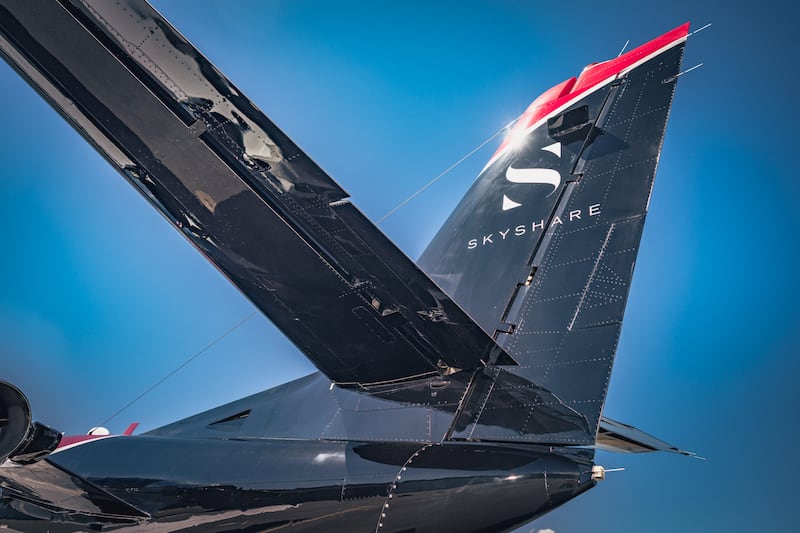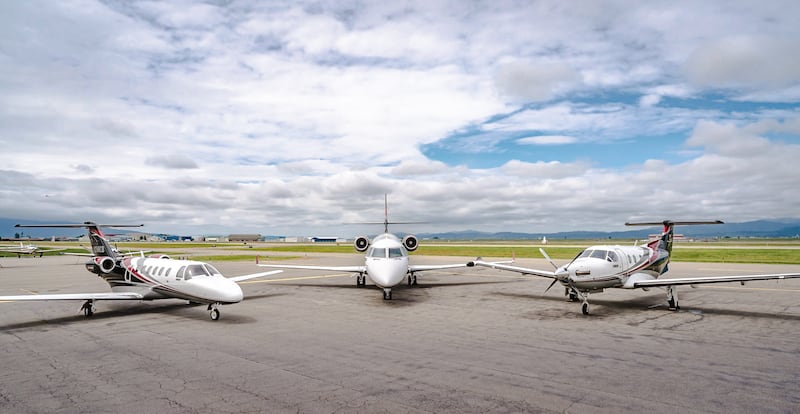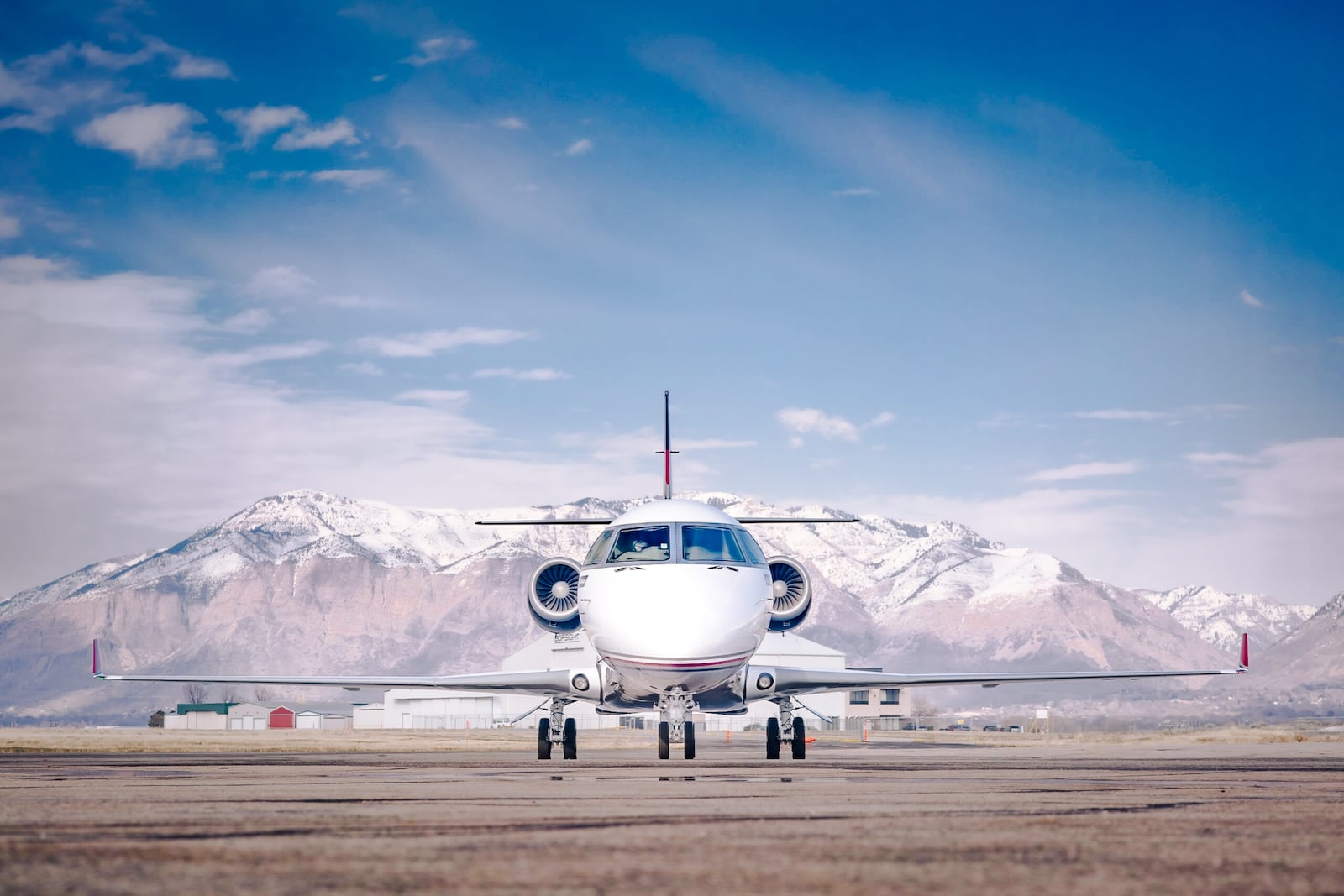SkyShare is on a mission to democratize flying private.
“Our business model is leveling the playing field for younger, hungry businesses to compete with the Goliaths in their field. Our ideal client profile is someone who is growing,” says Michael Patwin, VP of marketing and brand at SkyShare.
SkyShare was developed by founder and CEO Cory Bengtzen with no outside funding. Other scrappy founders — like Mike Littledike, who started Capita Financial Network as a one-person operation in 2008 — are the exact types of entrepreneurs SkyShare is looking to service.
“A private plane allows you to be around other like-minded individuals in a safe space to have vulnerable, deep conversations,” Littledike says. “It’s almost impossible to assign a dollar value to these conversations. The time on jets is the most valuable time with clients I ever have, full stop.”
Littledike started as a fractional jet owner and eventually bought his own aircraft through SkyShare’s brokerage department, also retaining SkyShare’s management team while reaping the benefits of full ownership.

An all-encompassing investment
“Anyone who is going to try to spreadsheet out a plane, they’re climbing the wrong line. Jets are about the convenience, the time savings, the experiences with your family. As a bonus — and this was totally unforeseen — I learned there are a ton of business opportunities,” he says. “People don’t say no to going on a golf trip on a jet.”
Patwin says SkyShare’s mission is to give more non-billionaire entrepreneurs these kinds of opportunities. So far, it boasts 70 owners through its fractional share programs: SFX and SFX+. Starting at a 1/16 share, owners receive 20 flight days in any jet within their program.
While SkyShare’s fractional ownership programs aren’t the first of their kind ― “NetJet is the godfather of this format, no debate,” Patwin says ― they are the most affordable.
The SFX+ program costs around $950,000 for a typical three-year clause. A single jet in SkyShare’s inventory can retail for multi-millions. Instead of Fortune 500 CEOs like NetJet, SkyShare is looking at what Patwin calls “the middle market,” with SFX+ at the upper limit and the traditional program at the lower.
“We looked at what our customers were flying most, the missions they were taking, and picked aircraft around that,” Patwin says. “Everybody is an entrepreneur, so they’re looking for this sort of diversity in options.”
With SFX, shareholders have access to planes that can handle most short-haul flights: Pilatus PC-12s, Citation CJs and Citation Excels. The SFX+ program includes these and three other aircraft: Challenger 300s, Gulfstream G200s and Gulfstream G450s, which are better for overseas trips.
“Flying from Denver to Hawaii, Salt Lake to Europe, Scottsdale to Rio … those sorts of trips can happen in the SFX+ planes,” Patwin says.

How much does fractional jet ownership cost?
For some potential shareholders, the near-million price tag was still daunting. Patwin says his team’s programs inadvertently cut “the little guys” out of the picture. In response, SkyShare debuted financing options for fractional ownership through a bank partner ― something no other aircraft company, NetJet included, is doing.
“Instead of coming up with the full $950,000, you only need 35 percent of that down,” Patwin says. “The standard SFX program also allows for 35 percent down, with shares starting at $335,000.”
Customers who finance their shares still benefit from the tax deductions associated with ownership and free up capital that is often desperately needed.
But even if you can fork over that 35 percent, there are a few other requirements for share ownership.
“You have to spend at least 50 percent of your time — or own a business — in the West to fly with SkyShare,” Patwin says, and trips must start or end in a Western state. Flying from Denver to Washington, D.C.? Green light. Flying from New York to Miami? Pick another fleet.
Patwin says this is what has kept SkyShare afloat while most of its former competition for the middle market shuttered.
“These companies that failed, they didn’t establish a root system,” he says. “They killed themselves on repositioning. You need to develop a tremendous infrastructure where you can work planes back. SkyShare is always in the backyard of the client, where they don’t need to do anything but pick up the phone.”
Flying pre-owned aircraft, carefully selected based on mission type, is the other piece that keeps SkyShare accessible.
“We’re not beholden to the manufacturers and their timetables; we can acquire aircraft whenever we desire,” Patwin says. “Also, we can look for aircraft priced around the same margin, so it doesn’t really matter which aircraft you’re on title to. You can be on title to a PC-12 and only fly the G200, or vice versa.”
Despite aiming for ― and claiming ― the middle market, Patwin says these program features have started attracting the upper class, too.
“People who can afford NetJets are still choosing SkyShare as a supplemental lift,” he says. “That shows us our product is pretty compelling.”

